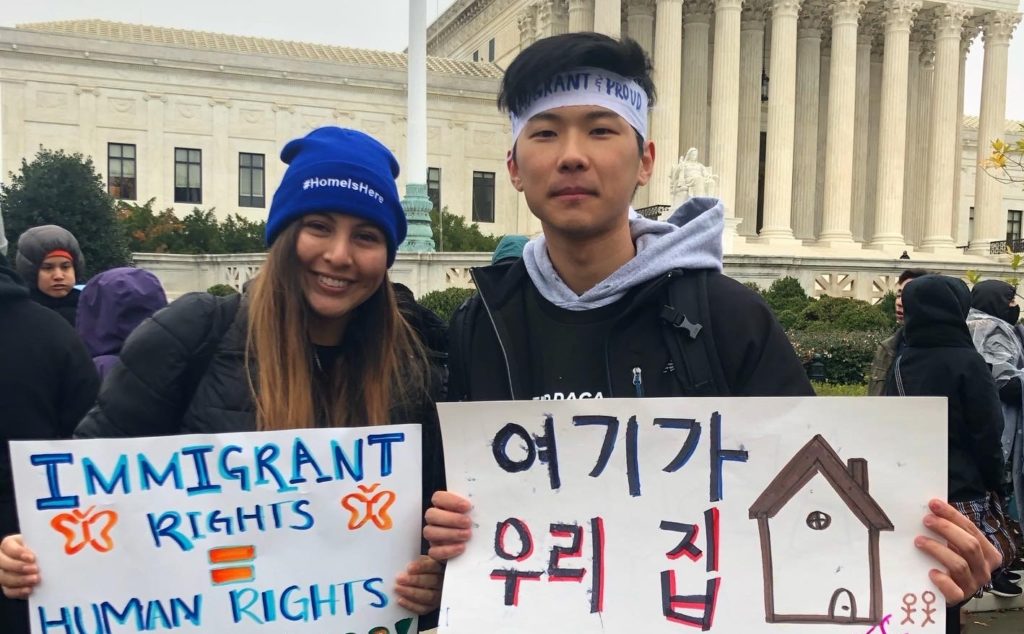The experiences of Asian American & Pacific Islanders (AAPI) have been historically fraught with misrepresentation. Confined to the middle of a Black and White binary and stereotyped as a monolith, AAPI communities and the conversation around their nuanced realities have been muddled, hindering meaningful conversation and change. This series will work to unveil the authentic narratives, pay tribute to histories, and contribute to a growing body of discussion on the AAPI experience. With CSSP’s journey of becoming an anti-racist organization and its mission of striving for a just society in which all children and families thrive, we as part of the staff are committed to reframing narratives and learning from the evidence we encounter. We hope this series will move AAPI communities from the middle into the foreground of racial dialogue and their truths will claim stake within America’s political consciousness.
Two weekends ago, I joined a group of Deferred Action for Childhood Arrivals (DACA) recipients, Temporary Protected Status (TPS) recipients, undocumented immigrants, and allies as they marched from Baltimore, MD to Washington, DC. Walking through the heart of Baltimore, we banged drums, shared chants, and huddled together for warmth from the unrelenting coastal winds. I joined the marchers as a ‘resident alien’, whose green card application has been pending for more than a year, suspended in backlog.
The portion of the march I joined was part of a larger initiative, the Home Is Here campaign, in which immigration activists participated in an 18-day long journey by foot from New York City to the steps of the Supreme Court in Washington, DC to demonstrate support for DACA and TPS. The march concluded just as oral arguments began for the three DACA cases Trump v. NAACP, McAleenan v. Vidal, and Department of Homeland Security v. Regents of the University of California, which were consolidated into a single argument. These cases could terminate DACA for the hundreds of thousands who rely on the program.
The National Korean American Service Education and Consortium (NAKASEC), a non-profit organization that works to expand grassroots advocacy and political power among Korean and Asian American communities, led much of the organizing efforts for the march. They work to mobilize Asian American communities who are often neglected from narratives about undocumented immigration despite accounting for an estimated 1.7 million out of the 11 million undocumented immigrants living in the country and comprising one of the fastest growing group of undocumented immigrants in the United States. Asian American and Pacific Islanders (AAPI) also belong to an ethnic and racial group that has long been historically victimized by a lineage of exclusionary U.S. immigration practices. In 1882, Congress passed one of its first federal laws relating to immigration, The Chinese Exclusion Act, which restricted immigration and citizenship on the basis of nationality to Chinese immigrants. More than 10,000 Chinese laborers used their hands to build the Transcontinental Railroad that linked the entire United States for the first time, but White Americans directed violence towards them, rioted in the streets, and claimed that Chinese assimilation was “neither possible nor desirable.”
While I navigate the U.S. immigration system from U.S. soil, my brother resides in Korea. My parents are actively trying to permanently bring him back home, wading through exorbitant application fees for a family-based green card. For our family, the path to American citizenship has been an excruciating, 18-year process—one that has only produced a disillusioned mother, an anxious father, and a separated family. Yet, undocumented people are told to take their place in a line that doesn’t exist to partake in a broken immigration system flawed with prolonged processing times, among a plethora of other ethical shortcomings.
It was with these reflections that I joined the marchers to the steps of the Supreme Court, eventually coalescing with over hundreds of other immigration advocates and organizing groups, many of which had flown into DC for the rally. Standing in front of this looming edifice, I wondered how we are to rebuild systems so that they liberate rather than oppress. I thought about the marchers; surely, the answer can be found somewhere within their unfettered optimism (“when we fight, we win!”), their unyielding belief in the power of organizing (“the people united will never be defeated!”), and their commitment to uplifting and empowering local communities (“this is what democracy looks like!”). And I could hear, with every chant bellowed into the air, these very structures shaking at the voice of the people.
American democracy touts “self-evident truths” as the foundation of this country while simultaneously failing to recognize the inconsistent applications of such ostensibly moral frameworks that have marginalized immigrant communities. Thus, it must be the people who bring accountability to a form of truth that holds fidelity to a more inclusive notion of “American.” DACA and TPS advocates embody this spirit of accountability through their 230-mile migration. The marchers reclaim migration, a term that has often begrudgingly occupied semantic space with dispossession and peril, as an act of beauty and demand broader, more inclusive futures for American institutions to work toward; their migration is at once a tribute to diasporic histories of inequity and an audacious act of vision-building toward compassionate borders; their migration is at once a celebration of immigrant power and a rallying cry for justice.
I am in awe of the undocumented leaders who risk their lives to fight a battle that benefits and uplifts all immigrants and inspired by NAKASEC, an organization demanding the inclusion of AAPI voices in undocumented narratives. It is their advocacy that, for one of the first times in my life, has given me an overwhelming pride in my own immigrant identity, and an ownership of it. These are the leaders who fight for citizenship for all, not just for the “deserving.” And we know that when we fight, we win.
